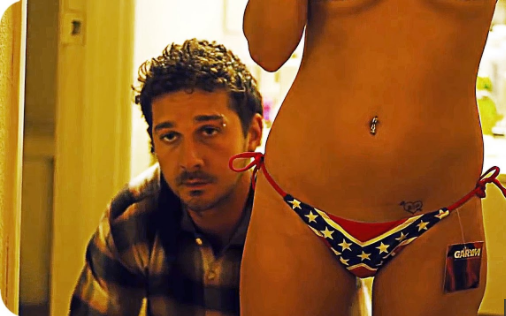If you’re looking for a film to reassure you that America is still one of the most economically booming countries in the world, Andrea Arnold’s American Honey is not here to console you. Interestingly, Arnold’s Britishness is perhaps what lends a hyper-objective portrait of the desolate existence of youths in Middle America. Her exploration of troubled, displaced teen characters was established with the rebellious, misanthropic nature of 15-year-old Mia (Katie Jarvis) in 2009’s Fish Tank, a natural jumping off point for the reluctant protagonist of American Honey, 18-year-old Star (Sasha Lane).
Struggling to make ends meet in white trash-prime Oklahoma, Arnold opens the film on Star dumpster diving for, among other food items, a still packaged chicken. Along for this bout of done-out-of-necessity “freeganism” are her surrogate children. We later find out she’s only taking care of them as a result of her uncle and aunt being largely unfit to do so themselves. Further into the backstory is Star’s origins being from Texas, which she was forced to leave after her mother died of a meth overdose. This is the tale of woe she tells for the first time to a trio of cowboys during her first magazine subscription sale. And how she ended up selling, of all things, magazines, is merely a case of vagabond-specific fortuitousness. After carrying the sad, sagging chicken (one of many standout emblems in the film) across the street to the K-Mart to follow her intuition to the sight of Jake (Shia LaBeouf, ultra-channeling James Franco in Spring Breakers), Star can’t deny her instant love at first sight attraction to him. As the obvious ringleader of a gaggle of “ragtag” youths dancing without inhibition to Rihanna’s “We Found Love,” Star watches him unabashedly as he moves to the beat in an overt effort to impress her. When he unknowingly drops his phone, she seizes the opportunity to return it to him in the parking lot.
Like some sort of bull and toreador standoff, the two approach each other, getting close enough to kiss. It is then that Jake proposes Star should come with him to pursue a “business opportunity.” Before she can accept of rebuff the offer, the white van filled with his crew whisks by. She notes, “They want you.” He arrogantly returns, “Everyone does.” Almost as though to prove it to herself, she insists, “I don’t.” Hopping on to the van, Jake shouts to Star that they’ll be leaving from the Motel 6 the following morning. This brief taste of excitement puts Star’s home life into sharp contrast, prompting her to flee after taking her honorary son and daughter to their mother as she’s line dancing in a bar.
In the parking lot of the motel, Star is startled and disappointed to learn that Jake has a girlfriend, Krystal (Riley Keough), who also just happens to be in control of the entire magazine selling operation. Still, Star’s jubilation is apparent as she gets into the van with the others, all equally as lost and poverty-stricken as she. And, more importantly, it’s the first time she’s experienced a true sense of community. While most are fine with their cursory hand-to-mouth existence, one of the most interesting and complex supporting characters is Pagan (Arielle Holmes), whose obsession with Darth Vader offers multiple instances of both comic relief and poignancy. Star eventually becomes so accustomed to her aura of blackness, that she takes it with a grain of salt when Pagan asks, “You know what Darth Vader looks like underneath his suit? A skeleton. Just like the rest of us.”
As Jake “trains” Star in the art of selling, their attraction to one another becomes increasingly challenging for them to ignore, and begins to reflect upon Jake’s salesmanship–a revelation that makes Krystal livid as she demands of Star, “How come Jake made less money today than he has the entire year?” Star, whose issues with authority become more apparent throughout the narrative, offers Krystal a placating excuse, one that is negated when Krystal asks, “Do I make myself clear?” and Star snarks back, “Crystal.”
Though her drive to sell is low, her brief peaks of charisma with older men work in her favor–each encounter ominously threatening to lead into a sexual assault, but, mercifully and surprisingly never quite culminating in that. In the meantime, her relationship with Jake only becomes all the more destructive, a mirror of sorts for the unfocused, uncertain lives of Americans (especially youthful ones) now.
Arnold’s adept use of semiotics and imagery is consistent throughout, with particular regard to use of insects (most notably bees and butterflies) and animals–Star’s Mowgli-like interactions serving as one of the prime sources of her relatability and still-maintained innocence.
Like a hybrid of Spring Breakers and if Regina George’s sister in Mean Girls had gotten a dark drama spinoff, American Honey makes no apologies for the state of Americana now: largely consisting of Kim Kardashian obsession, poverty and a love of meth and Mountain Dew. It’s a long way from Norman Rockwell’s portrait of it, but hey, time augments all wounds.





















